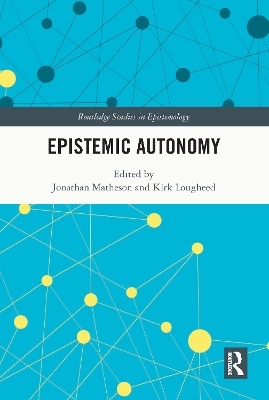
Epistemic Autonomy
Routledge (Verlag)
978-0-367-43334-5 (ISBN)
While the nature of and value of autonomy has long been discussed in ethics and social and political philosophy, it remains an underexplored area of epistemology. The essays in this collection take up several interesting questions and approaches related to epistemic autonomy. Topics include the nature of epistemic autonomy, whether epistemic paternalism can be justified, autonomy as an epistemic value and/or vice, and the relation of epistemic autonomy to social epistemology and epistemic injustice.
Epistemic Autonomy will be of interest to researchers and advanced students working in epistemology, ethics, and social and political philosophy.
Jonathan Matheson is a Professor of Philosophy at the University of North Florida. He is the author of The Epistemic Significance of Disagreement and co-editor (with Rico Vitz) of The Ethics of Belief: Individual and Social. Kirk Lougheed is a postdoctoral fellow in philosophy at the University of Pretoria with funding from the Social Sciences and Humanities Research Council of Canada. He has published over 25 articles in such places as Philosophia, Ratio, and Synthese. He is the author of The Epistemic Benefits of Disagreement (2020), The Axiological Status of Theism and Other Worldviews (2020), and the editor of Four Views on the Axiology of Theism: What Difference Does God Make? (2020).
Introduction: Puzzles Concerning Epistemic Autonomy
Jonathan Matheson and Kirk Lougheed
Part I: The Nature of Epistemic Autonomy
1. Epistemic Autonomy and Externalism
J. Adam Carter
2. Autonomy, Reflection, and Education
Shane Ryan
3. The Realm of Epistemic Ends
Catherine Elgin
4. Professional Philosophy Has an Epistemic Autonomy Problem
Maura Priest
Part II: Epistemic Autonomy and Paternalism
5. Norms of Inquiry, Student-Led Learning, and Epistemic Paternalism
Robert Mark Simpson
6. Persuasion and Intellectual Autonomy
Robin McKenna
7. What’s Epistemic about Epistemic Paternalism?
Liz Jackson
Part III: Epistemic Autonomy and Epistemic Virtue & Value
8. Intellectual Autonomy and Intellectual Interdependence
Heather Battaly
9. The Virtue of Epistemic Autonomy
Jonathan Matheson
10. Understanding and the Value of Intellectual Autonomy
Jesús Vega-Encabo
11. Epistemic Myopia
Chris Dragos
12. Intellectual Autonomy and its Vices
Alessandra Tanesini
13. Gaslighting, Humility, and the Manipulation of Autonomy
Javier González de Prado
Part IV: Epistemic Autonomy & Social Epistemology
14. Epistemic Autonomy for Social Epistemologists: The Case of Moral Inheritance
Sarah McGrath
15. Epistemic Autonomy and the Right to be Confident
Sanford Goldberg
16. We Owe it to Others to Think for Ourselves
Finnur Dellsén
17. Epistemic Self-Governance and Trusting the Word of Others: Is There a Conflict?
Elizabeth Fricker
| Erscheinungsdatum | 10.08.2021 |
|---|---|
| Reihe/Serie | Routledge Studies in Epistemology |
| Verlagsort | London |
| Sprache | englisch |
| Maße | 152 x 229 mm |
| Gewicht | 453 g |
| Themenwelt | Geisteswissenschaften ► Philosophie ► Erkenntnistheorie / Wissenschaftstheorie |
| Geisteswissenschaften ► Philosophie ► Ethik | |
| Naturwissenschaften | |
| ISBN-10 | 0-367-43334-6 / 0367433346 |
| ISBN-13 | 978-0-367-43334-5 / 9780367433345 |
| Zustand | Neuware |
| Haben Sie eine Frage zum Produkt? |
aus dem Bereich


![Was heißt Denken?. Vorlesung Wintersemester 1951/52. [Was bedeutet das alles?] - Martin Heidegger](/media/113619842)